For Paul Sewald, life in the minor leagues is being patient and penny-wise
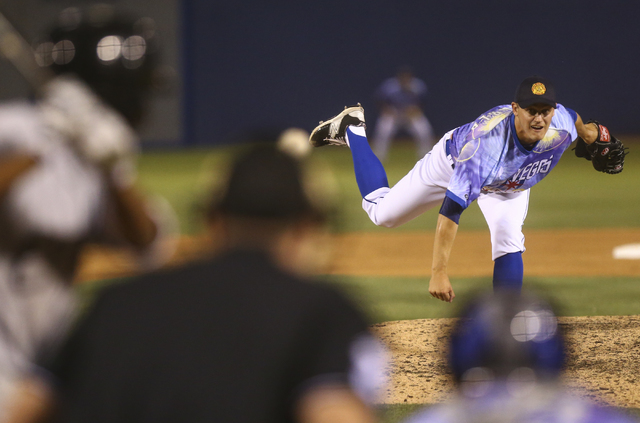
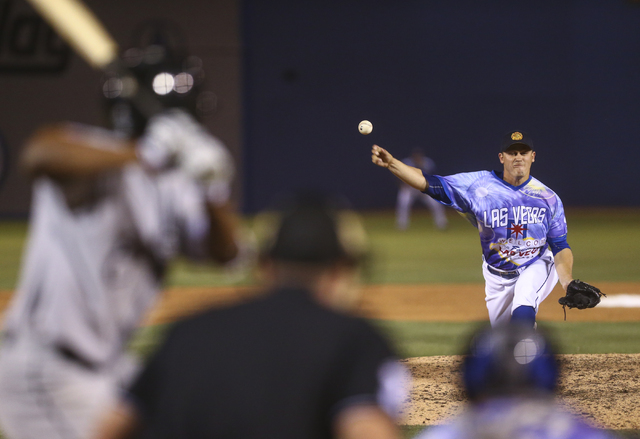
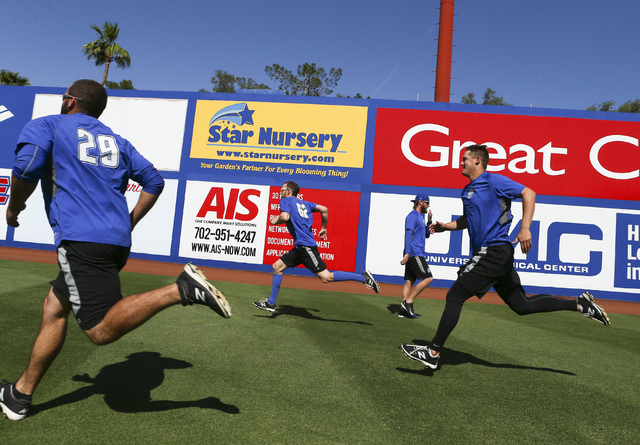


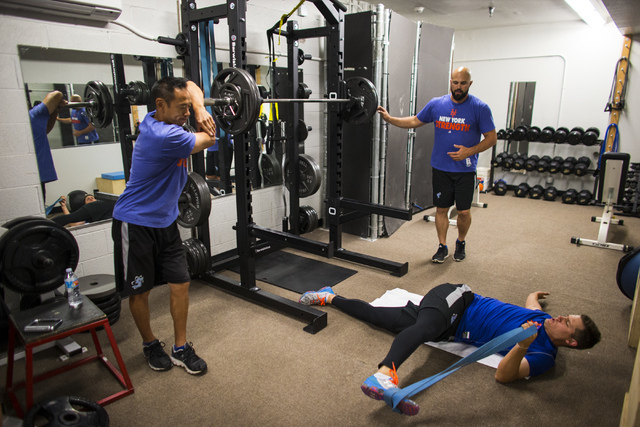
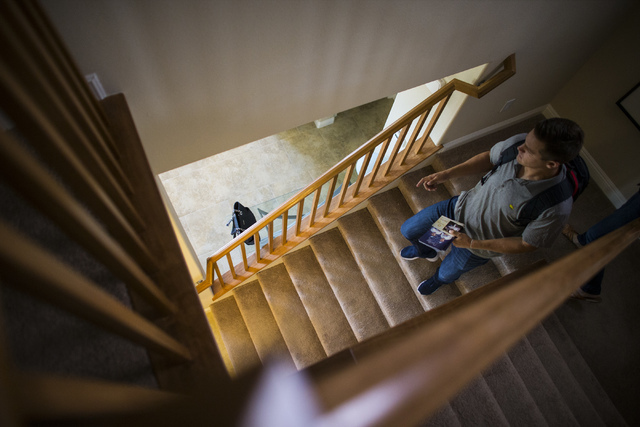
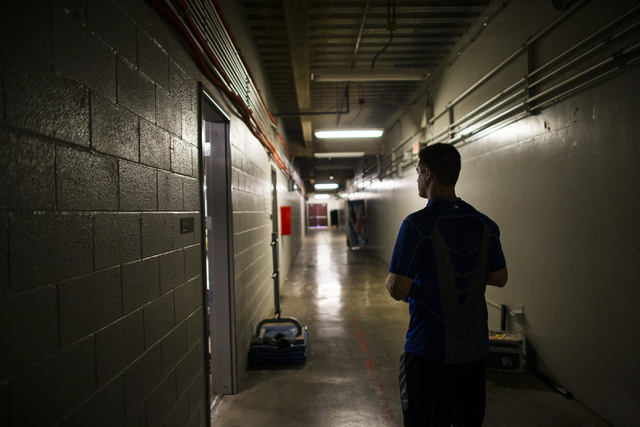


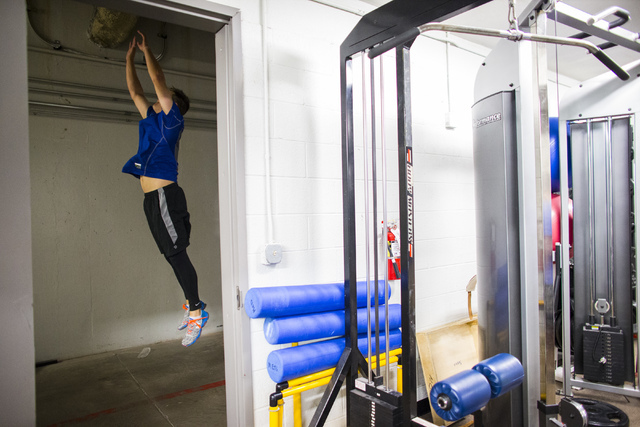
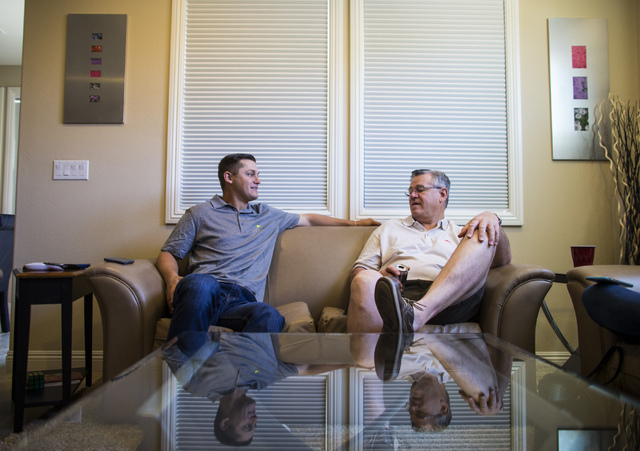
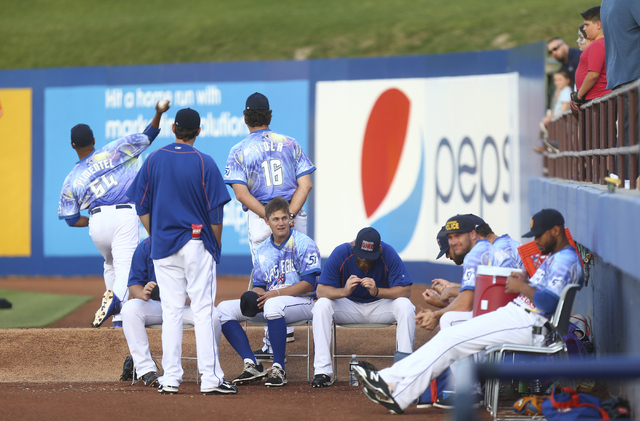
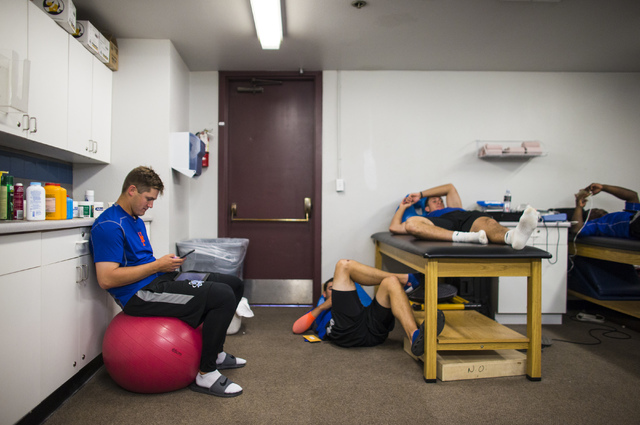
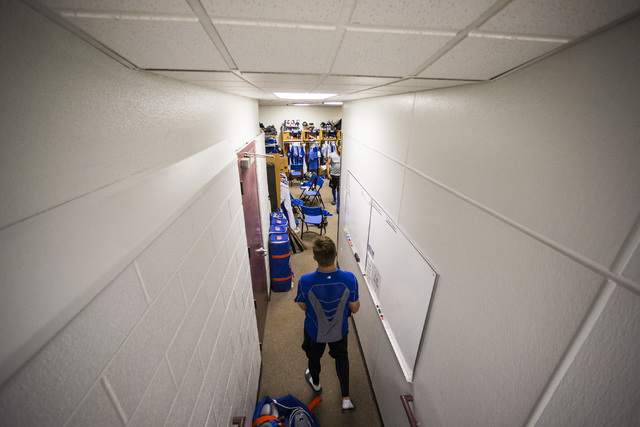
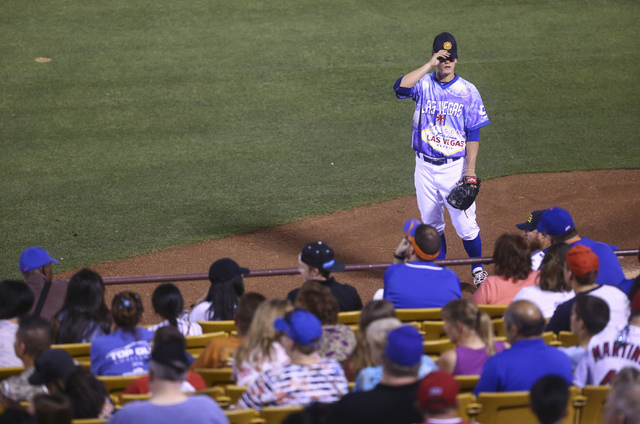
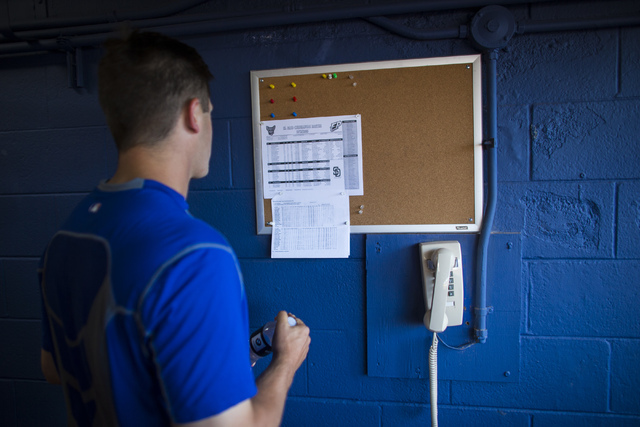

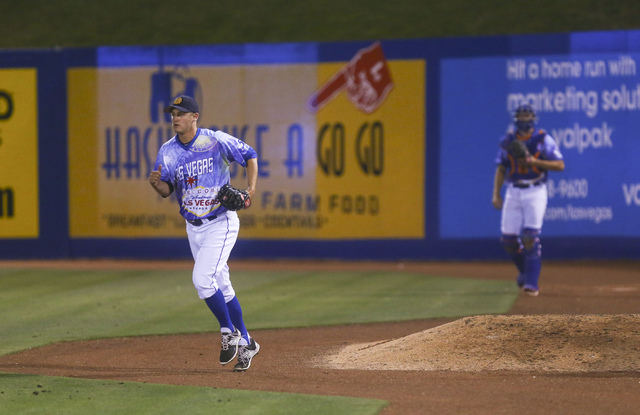
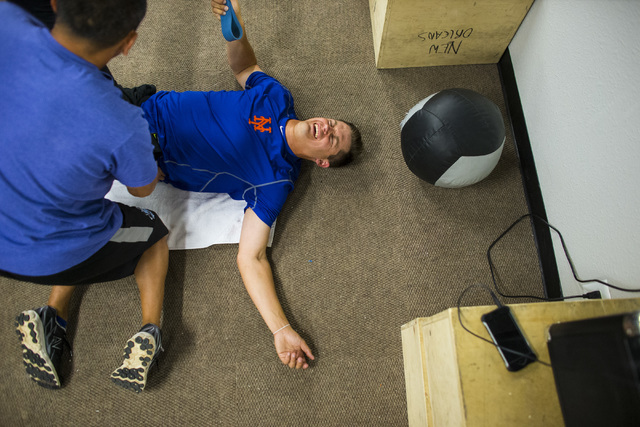

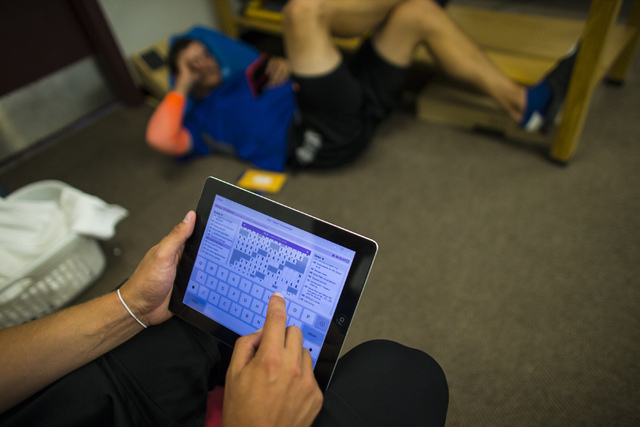
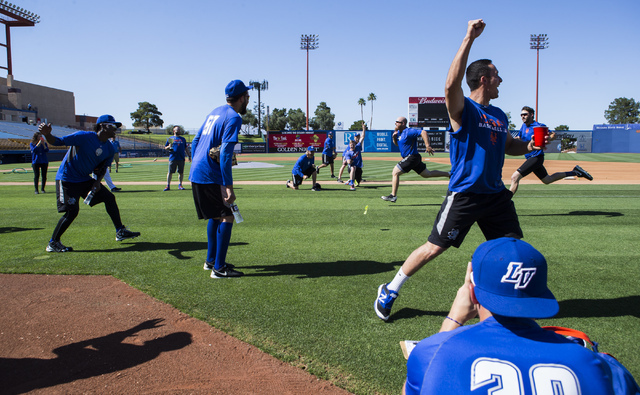
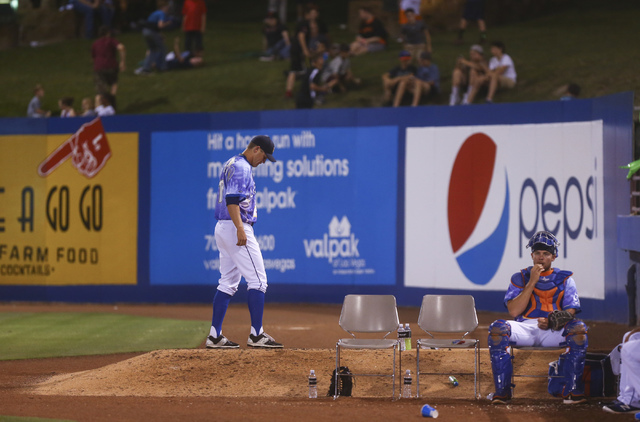
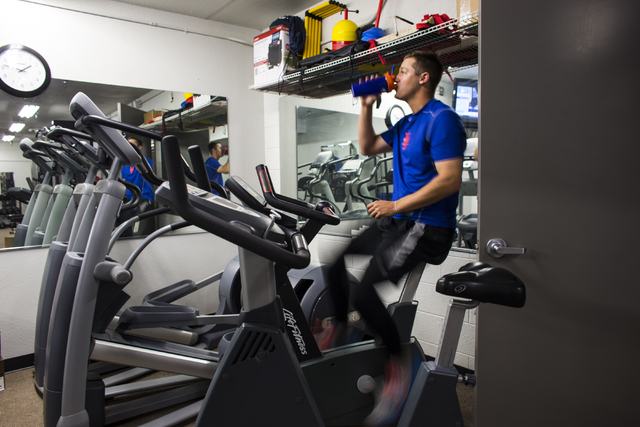
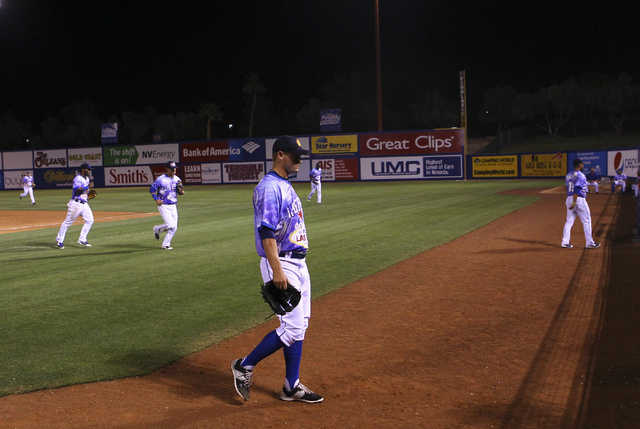
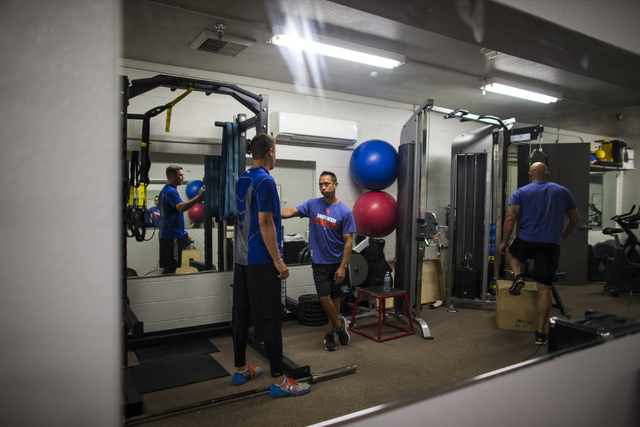
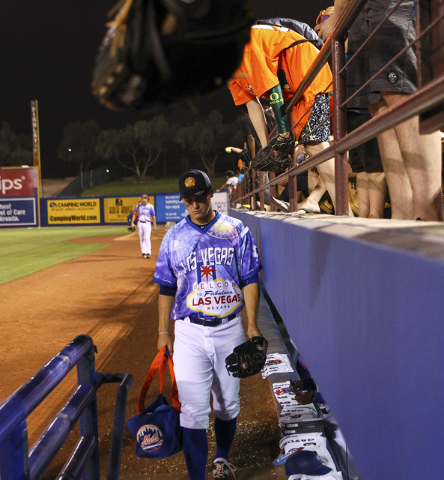
Paul Sewald doesn’t like to do the math.
It’s not math itself he’s adverse to — Sewald, the oldest son of two accountants, graduated with a major in accounting from the University of San Diego — but rather what the numbers illustrate that he’d rather not know.
They’re numbers that show that Sewald, a 51s reliever and Las Vegas native, makes just more than $71 a day, marking a step up from years past but making his hourly wage less than that of an average fast food worker.
“It hurts to think about it,” Sewald said while sitting on a couch next to his dad at his parents’ Summerlin home where he lives.
Sewald, 26, is one step away from what he’s been working toward for his whole life. His life in many ways resembles that of a typical minor leaguer — one who is paid minimally but perserveres through both professional and personal obstacles as he strives for the next level. While he could complain about low pay for long, hard hours, he could also accept fact that he is on the path to Major League Baseball, life in the minors will be unglamorous. He’s taken the second option.
“There’s the occasional complaint. Obviously it’s like 175 degrees in Florida and it’s July and it’s also raining and you’re kind of sitting there like ‘Is it really worth $40 today? I don’t know,’” Sewald said. “But I want to play Major League Baseball and the only way to do that is to grind through the minor leagues.”
THE MONEY
Between the white chalked foul lines, it’s almost completely the same.
“It’s all baseball,” players say. Sixty feet, six inches from the mound to the plate. Ninety in between the bases.
Sure, the quality of play is lessened and minor league baseball has its quirks, but it’s more or less the same on the field.
Off the field, though, it couldn’t be more different. It’s chartered flights versus commercial — or worse, long bus rides. It’s state of the art equipment versus cramped quarters at the carpeted Cashman Field workout room.
It’s having the stability and wealth to settle down versus trying to cram four or five guys into an apartment to save a few bucks and in some situations, not knowing what team you’ll be playing for in a couple weeks.
Money — or the lack thereof — is a prevalent issue in the minors and nobody knows that more than players like Sewald.
By the time players reach Triple-A, there are ways to make money. Minor league free agents as well as players on the 40-man roster make a decent living. It’s not close to the Major League minimum, which tops $500,000, but it’s livable.
There are also high draft picks who, though their salary is low, can live off their signing bonuses, which are sometimes in the millions. Sewald falls into none of those categories.
He was drafted in the 10th round of the 2012 draft and received $1,000 as his bonus. As a Mets draftee who hasn’t reached free agency and is in his first season at Triple-A, he makes $2,150 a month.
That’s up from $1,100 in his first season in the minors which, though it seems paltry, is still better than it was decades ago when 51s manager Wally Backman started his professional career and made less than half of that.
The money, people associated with minor league baseball say, is the biggest misconception others have.
“Fans have absolutely no clue how much we make. They think because you are a professional baseball player, what they see on TV is that,” Sewald said. “People ask for my glove. They say ‘Well, you can just go get another one.’ If I got a new glove, that would be like half my paycheck. I can’t just go out and get a new glove.”
Underpayment is an ongoing gripe — one that is being addressed through a lawsuit filed in 2014 by a group of former minor leaguers claiming Major League Baseball has been “suppressing minor league player salaries in violation of federal and state labor laws,” per Baseball America.
“(MLB says) you don’t have to play Minor League Baseball. Well you do if you want to play Major League Baseball, but you don’t have to play Minor League Baseball,” Sewald said. “If you don’t like it, you don’t have to play. The minor league motto is ‘If you don’t like it, just play better.’ That’s what it comes down to. If you don’t like it, if I don’t give up a single run the whole season, I won’t be a minor leaguer any more.”
By contrast, a single day’s pay at the Major League minimum is more than $3,100. Staying just four days in the Majors ensures a salary that eclipses Sewald’s entire yearly paycheck.
At some point down the line, the lawsuit will reach its end.
But by that point, Sewald hopes it’s no longer impacting him.
LIFE AT HOME
In years past — when he played in Savannah, Georgia, for example — Sewald would have to find a group of teammates he wanted to live with, head to Google and then tour apartments upon reaching the new city.
“For me, it was like ‘We need four guys in this $1,300 apartment complex because that’s all I could pay,” Sewald. “Essentially one check’s going to rent and the others I have to try to put away and save a little bit of money. It really came down to (finding) people in my price range more than anything.”
This year’s accommodations are perfectly within his price range and Mark and Judi Sewald are happy to have their oldest son home.
It’s nice for Sewald to come home and not have teammates around all the time (“I don’t want to see the same people every single minute of the day,” he said), not having to pay rent eases the financial burden and he appreciates the opportunity to spend time with his parents.
After all, if he gets to where he wants to be — up with the Mets — he’ll be on the other side of the country once more.
“It’s good. It’s different. It’s so different. He’s never lived at home as an adult because even when he was in college, they play in the summer,” Judi said. “We’d get him for two weeks at Christmas and then other than that, we never got to see him, so it’s hard. Thank God for phones.”
The Sewalds made some trips to see their son in past seasons, but this year, they’re out at the park for most of the home games.
So, too, is longtime girlfriend, Molly Hopcraft, who gets off work, goes home for dinner and arrives at the stadium in time to see Sewald pitch. This is their second season together and so far, it’s safe to say it’s easier than the first.
“It’s been really exciting,” Hopcraft said of having Sewald home. “Just to be able to both come home at the end of the night and talk it over and see how things went and be able to encourage him and cheer him on in person, I think that has been really good.”
Hopcraft flew out to Binghamton, New York, where Sewald was playing for a week last season. She also saw him play for Team USA in Toronto in the Pan Am Games. But that was it over the course of the season and Hopcraft had to watch most games on the computer.
While the travel schedule is still difficult this year — and doesn’t get markedly better in the Majors — money, again, plays a role making cross-country relationships easier to maintain.
“Say I get called up to New York, I’m away, but I do have the money for her to come visit, for my parents to come visit,” Sewald said. “So that would be fantastic. You could have a few more trips.”
For now, it’s nice to be home. Sewald spends his mornings with his dad. While his mom works early, the pair often watch golf together. Golf, not baseball, reigns supreme on the Sewald household’s televisions.
Throughout the house, there are plenty of baseball references, from Paul and Johnny’s old jerseys hanging on the wall to a wooden console outfitted with pictures of both sons playing and few buckets of decorative baseballs perched on top, but when Paul’s at home, he tries to escape the sport with Netflix and golf.
“It’s nice for me to be able to turn it off and be able to turn it on when I get to the field,” he said. “For me, it’s nice to just get away from it a little bit.”
THE OFFSEASON
Many Mets minor leaguers — those without cars or a teammate to hitch a ride with — arrive to organization’s complex in Port St. Lucie, Florida, on a shuttle bus from nearby hotel. Those in Major League camp, like Sewald, were put up in the Holiday Inn Express, a bit closer and step up from the hotel most of the rest of the minor leaguers were at.
Some major leaguers opt for houses or nicer digs, a luxury unavailable to most of those in the minors.
Sewald, of course, can’t do that, and has to survive on his meal money because players are unpaid during spring training, despite the fact that they’re there for nearly a month and a half working virtually every day.
“You would think that for something that is mandatory to go to, they would pay you to be there, but for some reason, they do not have to pay you to go to spring training,” Sewald said. “I can’t figure that out.”
It’s the same for all players — but it’s especially hard on minor leaguers. At major league camp, Sewald received $89 a day for meal money, which is more than he earns for a day’s work at Triple-A. At minor league spring training, it’s $15 per week, though the Mets provide three meals a day.
Players don’t get paid during the offseason, either, instead having to make six months worth of salary cover the entire year. That’s why many minor leaguers play winter ball in other countries or seek out part-time jobs.
This year, if he doesn’t get called up before September, Sewald might try to go play winter ball somewhere. It’s worth it, even if it does cut into his offseason. He estimated he might be able to make $20,000 if he goes for just two months.
If not, he’ll likely be back subbing at his alma mater, Bishop Gorman, which he has been doing for four years.
“I was trying to make a little bit of money in the offseason and keep myself occupied because for the first time in my life, I didn’t have a million things going,” Sewald said. “For me, it was perfect. It was just enough to give me a little bit of extra spending money.”
THE DAY
The travel schedule is grueling at the lower levels and it’s exacerbated further by buses that are prone to breaking down. And at one level of the minors, pregame meals consisted mainly of peanut butter and jelly and the pay averaged around $36 per game. The travel, food and money are a little better at Triple-A, though the days are still long and difficult.
“If people think we’re just coming in here and taking batting practice and it’s a game afterwards, they’re highly mistaken,” Backman said.
Sewald usually gets to the park around 1 p.m. or so and doesn’t leave until at least 10:30 p.m. depending on how long that night’s game lasted. Before coming to the park, he’ll wake up around 9 a.m., eat breakfast, get his body going and hang out before grabbing lunch around noon.
Twice a week, players have to get in a workout. Strength and conditioning coach Jon Cioffi puts him through a full-body workout where he hits his lower body, upper body and core. He does flexibility stretches and shoulder strengthening exercises designed to get him at his peak at all times.
It can be tough with relievers, who never know when they’re going to pitch, but Cioffi said Sewald does a good job scheduling his workouts.
“There’s never really a big shock to his body (and he) never goes a bunch of days with a long span of times without getting his workouts in,” Cioffi said. “His body is pretty much always going to be used to the workload of his workouts as well as his pitching in the game.”
After his workout — or time spent charting pitches from the day before — pitchers hit the field shortly after 3 p.m. to do conditioning with Cioffi.
Then they throw, and Sewald, a fan of routine, always partners with Chasen Bradford. Pitching coach Frank Viola watches from the side, afraid the two relievers are trying to kill each other.
“They scare the hell out of me because they’re both throwing, it looks like, as hard as possible at times with all kinds of movement but they do what they need to do,” Viola said.
After shagging balls during batting practice, Sewald eats. The post-BP spread is usually something light — maybe he’ll have a sandwich with some fruit. Players are provided with a postgame meal, too, where they’ll get proteins, healthy carbs and some type of green vegetable.
By now, Sewald is well aware of what works for him. That means a lot of water and easing off the soda. Every couple weeks, his weight and body fat percentage is taken and Sewald, who said he tries to take decent care of his body, hasn’t had a problem during those check-ins.
Clubhouse dues, which are $15 a day, cover meal expenses at the park. If he makes $71 a day, that’s more than 20 percent of that day’s salary, though at this level, he said what he gets from his dues is worth the money. On the road, players get $25 per day for meal money and Sewald often puts that money toward dues.
While he’s got downtime, he studies both what he’s done successfully in the past and the hitters whom he’ll be facing.
Longtime teammate Brandon Nimmo referred to him as a technician. Sewald might not overpowering on the mound, but his preparation has helped lead to success at every level he’s been to.
“He’s a perfectionist. He needs to be right there. He doesn’t have a lot of give for mistake,” Nimmo said. “He doesn’t say ‘Oh, I only missed by a couple inches.’ He wants it where he wants it.’”
Once the game starts, Sewald finally has time to relax.
Las Vegas relievers play a word-association game called “Password,” to pass time in the earlier innings before becoming more focused in the later innings.
Some days he’s called upon to pitch. Other days he spends the whole game in the bullpen. Either way, he’s spending a bulk of his day at the park.
THE MAJORS
These days, Kris Bryant is everywhere, from commercials to billboards to everything in between. Sewald has known Bryant since the latter was five. They played both little league and college ball together.
“It’s crazy to think that I’m that close and it’s crazy to think that Kris is (there),” Sewald said. “Everybody knows Kris. It’s nuts. … How did he get to that point that quickly?”
He even faced him at some point, though evidentially he’s suppressed that memory. His parents haven’t.
“He took you deep,” Mark told his son.
“You blocked that out of your mind,” Judi added.
Sewald had a chance to face him at Big League Weekend in March at Cashman Field. He got Bryant to line out.
It’s an opportunity he’d surely like to get again, though next time in a Major League game. Though the differences might make the majors seem a world away, in the grand scheme of things, Sewald is close — potentially an injury or two away. While Sewald doesn’t watch baseball, he’s cognizant of what’s happening with the Mets. Or, as Viola put it, if a guy has a hangnail, 51s players know about it.
“Baseball is a right place, right time (sport),” Viola said. “You have to be at the right place at the right time. They have to be looking for something specific when you get called on.”
This season he has pitched 28 1/3 innings in 26 appearances, allowing a 3.81 earned-run average with a 3-2 record and seven saves. If one thing gets him to the majors, it’s his walks-to-strikeouts ratio (5-to-33).
While he awaits his opportunity, Sewald sees other players weeded out, unable to deal with the difficulties of the minors. And while he waits, he puts his head down, limits his complaints and works to improve, trying his best to not let the daily grind wear on him.
“(Players) just get tired of the whole thing. I think that gets people that are just like ‘You know what, it’s not worth it,’” Sewald said. “There’s so many guys to beat out. It’s like if you don’t want to do it, that’s fine because I want to.
“And if you’re not going to give it everything you have, then you weren’t going to make it anyways.”












